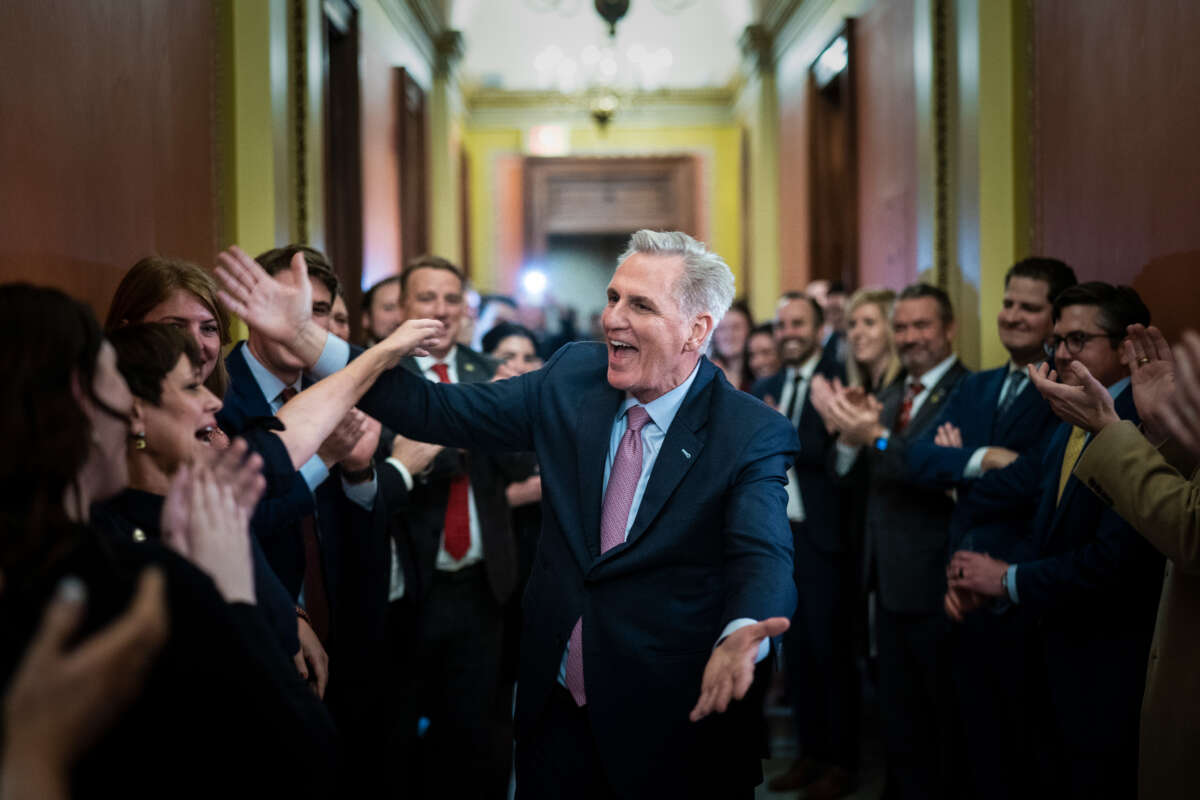Republicans approved new House rules on Monday making it easier for lawmakers to cede federal public lands to state and local governments without accounting for the costs to taxpayers. Conservationists warn that cash-strapped cities and states could then sell off natural areas that were previously protected to private developers and extractive industries.
Passing a rules package for House business was the next step toward legislation for the Republican majority after a difficult week of wrangling to elect House Speaker Kevin McCarthy. The 55-page rules package is the result of weeks of negotiation between McCarthy and a faction of ultra-conservatives who used the GOP’s slim majority to squeeze out a number of concessions and create a painful spectacle on the House floor last week, when McCarthy was finally elected after 15 rounds of voting.
Some of the rule changes were expected, including new rules curbing McCarthy’s power and making it easier for lawmakers to demand spending cuts and launch partisan investigations into the Biden administration. However, Democrats say new rules barring the Congressional Budget Office (CBO) from calculating the value of federal public lands given away by Congress is a throwback to a previous Republican majority that pandered to anti-government extremists in mostly Western states.
Rep. Raul Grijalva of Arizona, the ranking Democrat on the House Natural Resources Committee, said Republicans are making it easier to “cheat American taxpayers and give away our public lands for nothing in return.”
“This is Republicans doing the bidding of anti-public lands extremists — a consistent theme we’ve seen when they were in charge before, and one I’m afraid we’ll see a lot more of in the next two years,” Grijalva said in a statement Friday.
Under previous House Rules, the CBO was required to calculate the cost to taxpayers of any legislation that would transfer public lands to state, local and tribal entities. Public lands create a variety of revenue from fossil fuel development, grazing and logging, for example. This revenue is often used to manage public lands across the country, from vast prairies and mountain ranges to smaller patches of wilderness often used for recreation.
The new rule from Republicans waives this requirement, declaring that any transfer of public lands by Congress does not create any new “budget authority.” As a result, CBO reports on legislation that would cede public lands and waterways would not include an estimate of the cost to taxpayers, which must be offset by spending cuts elsewhere under separate House rules aimed at cutting taxes and spending.
“It’s an artificial contrivance that sort of deems the giving away of public lands as budget-neutral so they can avoid their own procedural handcuffs,” said Brett Hartl, government affairs director at the Center for Biological Diversity, in an interview.
House Republicans instituted a similar rule in 2017 after securing a majority. Three weeks later, Republicans from Western states introduced legislation that would have ceded 3 million acres of federal public lands to states. The bill was quickly withdrawn after lawmakers faced backlash from constituents, who worried the change would limit access to natural areas for hunting, fishing and other pastimes. As he withdrew the bill, former Rep. Jason Chaffetz (R-Utah) posted a photo of himself wearing hunting gear and assuring his constituents that “I’m a proud gun owner, hunter and love our public lands.”
At the time, Republicans were under pressure from anti-government ranchers and activists epitomized by Cliven Bundy, the extremist who sparked an armed standoff with federal police in 2014 over cattle grazing on public lands. Bundy and his heavily armed followers believed it was their religious or civic duty to defend against the “tyranny” of the federal government by resisting its control over publicly held territory in Nevada. While Bundy and his gun-toting posse may have been outliers, Hartl said the new House rule for calculating the value of public lands represents the wishes of a “very vocal minority.”
“It shows the ideological position of these House Republicans, which is generally that public lands are worthless, they don’t believe in them, and they want to be living in a world where they are either run by the state or handed over to extractive industries,” Hartl said.
However, Hartl said the debate over public lands is not just an issue in Western states, where ranchers and fossil fuel companies have long lobbied for cheap access to federal public lands. People across the country use and enjoy federal lands, from national forests to wildlife preserves, Hartl pointed out.
Republican legislation to cede public lands would face opposition in the Senate, but the change could make it easier to hide riders in omnibus legislation without triggering a cost-benefit analysis from the CBO. Grijalva, who chaired the House Natural Resources Committee under the Democratic majority, said Democrats will be on the lookout.
“We’ve seen Republicans struggle to count to 218 — and now they’re ordering Congress’s accountants to cook the books for them,” Grijalva said. “This is not good economic or environmental policy.”
Join us in defending the truth before it’s too late
The future of independent journalism is uncertain, and the consequences of losing it are too grave to ignore. To ensure Truthout remains safe, strong, and free, we need to raise $46,000 in the next 7 days. Every dollar raised goes directly toward the costs of producing news you can trust.
Please give what you can — because by supporting us with a tax-deductible donation, you’re not just preserving a source of news, you’re helping to safeguard what’s left of our democracy.
